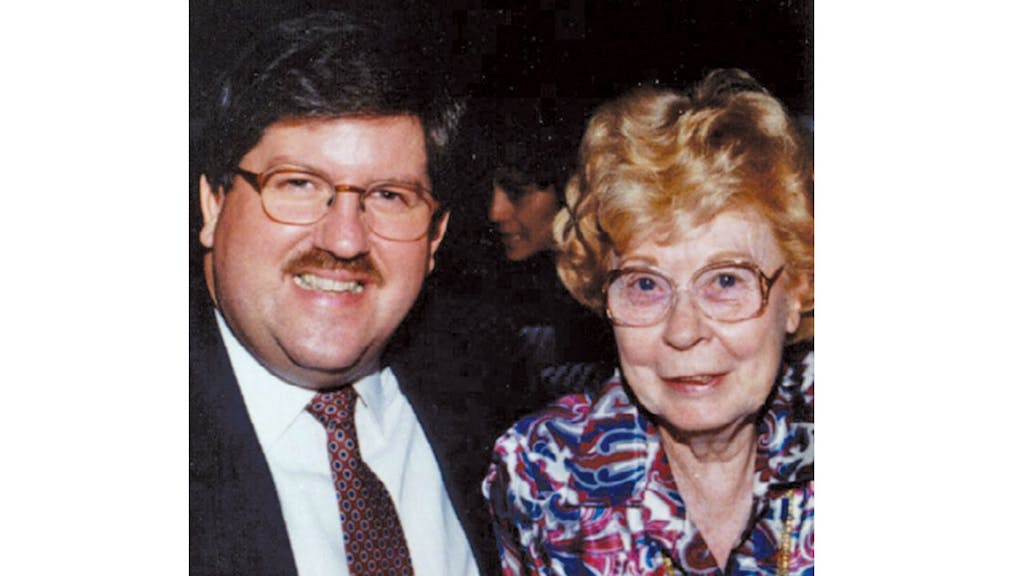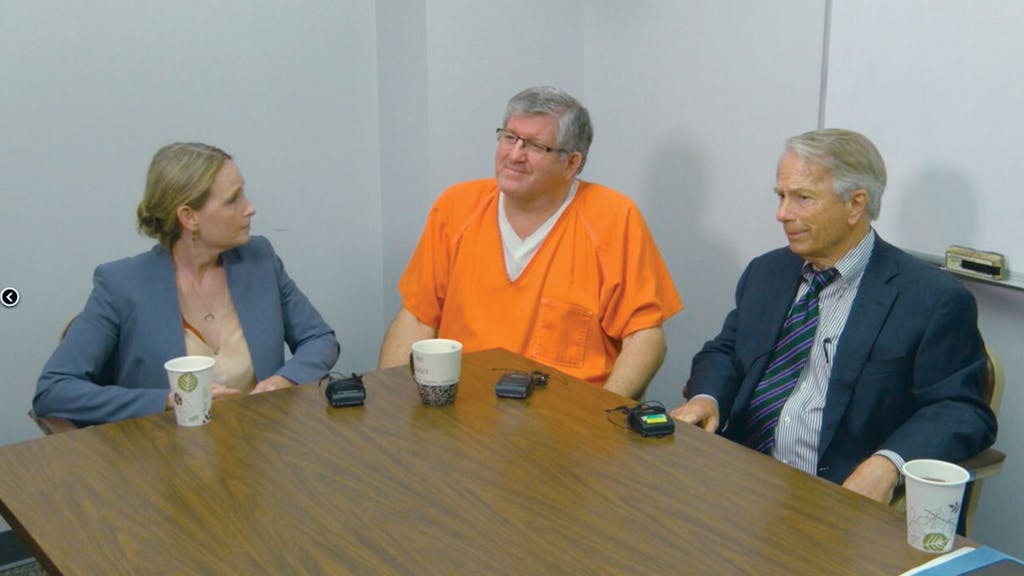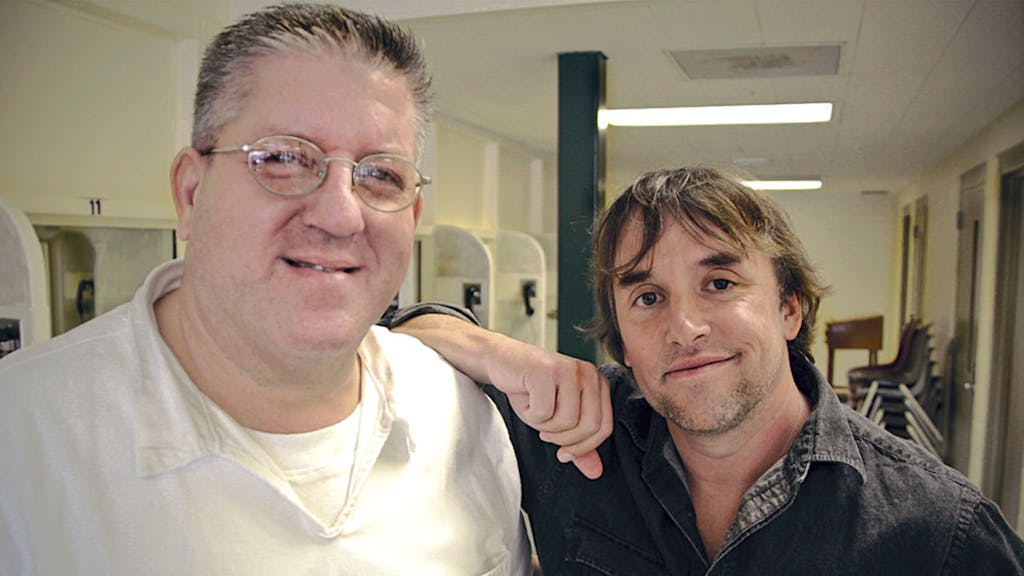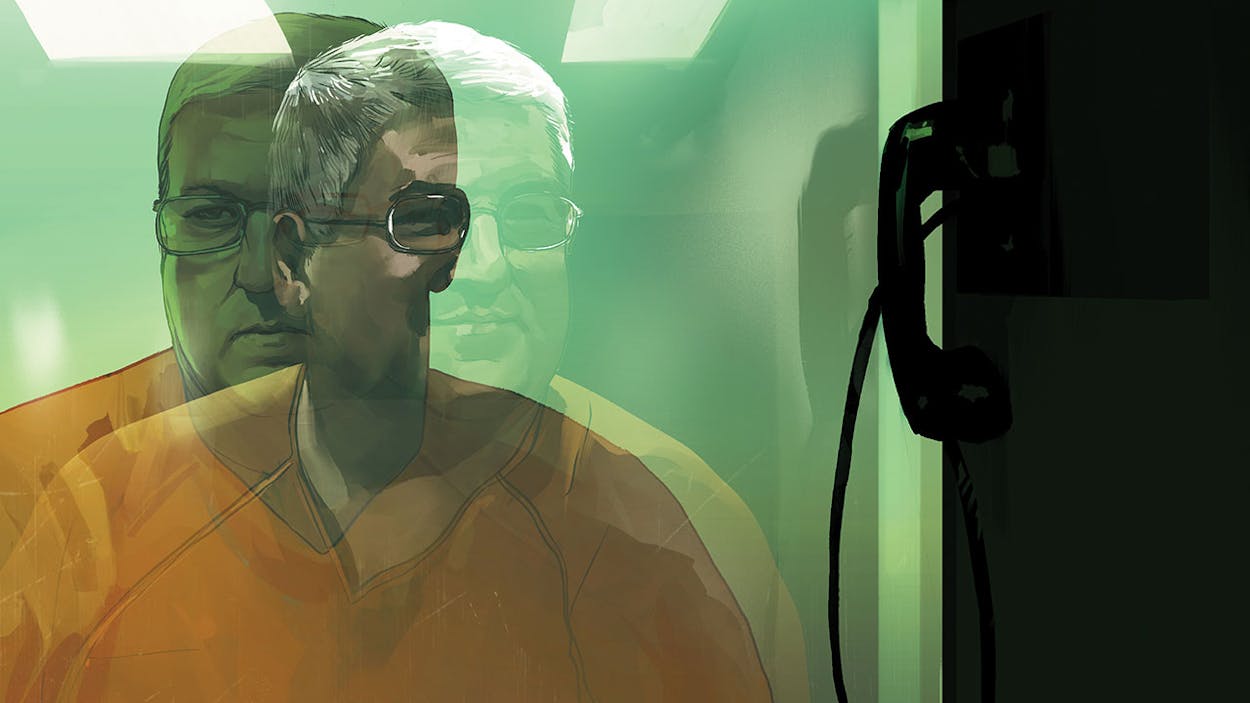“So what’s your opinion of Bernie Tiede now?” a friend asked me shortly after a jury had ordered Tiede to spend life in prison for the murder of 81-year-old Marjorie Nugent.
“Well,” I said, and I paused.
“What I think is . . . ” I said. And I paused again.
For nearly twenty years, I’ve been trying to decide just how I feel about Tiede, the soft-spoken, chubby-cheeked former mortician from Carthage, whom I first wrote about for Texas Monthly in January 1998. In 1990 Tiede befriended Nugent at the funeral of her husband, a wealthy oilman and banker. A few years later, at Nugent’s request, he quit his job to become her personal assistant, business manager, and traveling companion. Estranged from her family, she also named Tiede the sole heir to her multimillion-dollar estate.
Then, in November 1996, he carried out one of the most bizarre crimes in Texas history. Tiede shot Nugent four times in the back with a .22 caliber rifle and hid her body in a freezer in her garage. For the next nine months, Tiede went on with his life, telling Carthage residents a variety of lies about why Nugent was no longer around. He spent more than $500,000 of her money, some of it going to such local institutions as the First Methodist Church and to fellow residents who were short on cash. Finally, in August 1997, after someone called the sheriff’s department to express concern about Nugent, officers searched her home and discovered her body. Tiede quickly confessed, stating that he had initially enjoyed being around Nugent until she became “very hateful,” “very possessive over my life,” and “evil and wicked.” He admitted that he had been fantasizing about hitting her over the head with a bat but had ended up shooting her because he “didn’t want her to suffer.”

One day after the story broke, I drove to Carthage, where to my astonishment I met townspeople who told me that Tiede was the most good-hearted man in town, even if he was, as one resident noted, “a little light in his loafers.” And Nugent, they pointed out, was a crotchety biddy who tended to get on people’s nerves. One woman actually said that if she was on the jury, she would vote to acquit Tiede.
I later had lunch at Daddy Sam’s BBQ and Catfish with Danny Buck Davidson, the bulldog-faced Panola County district attorney, who told me he was so disturbed by the townspeople’s support of Tiede that he had decided to ask the judge overseeing the case for a change of venue. “I’m not sure I can find twelve citizens in Panola County willing to convict Tiede,” he said, shaking his head as he took a bite of slaw.
Tiede was still locked up and awaiting trial when my original story was published, and it wasn’t until early 1999 that I got my first sighting of him, at his trial in the town of San Augustine, about sixty miles from Carthage. When he walked into the courtroom, he nodded politely at the judge and even at Davidson. Toward the end of the trial, he testified that he had loved Nugent even though life with her had been like “being in prison to some degree . . . being smothered.” He said that he’d never actually planned to kill her, despite what he’d said in his confession, and that when he’d done so, he’d felt as if he had watched himself pick up a gun and start firing. Unimpressed, the jury took only ninety minutes to convict him, and two days later Tiede was sentenced to life in prison. “We love you, Bernie,” his supporters yelled as he was escorted out of the courthouse, a tormented look on his face.
It wasn’t long after that that Richard Linklater, the well-regarded Austin filmmaker, and I co-wrote a screenplay about Tiede. The script sat on a shelf for more than a decade before Linklater filmed it, with Jack Black as Tiede, Shirley MacLaine as Nugent, and Matthew McConaughey as Davidson. Just after the movie wrapped, in late 2010, I met Tiede for the first time, visiting him for about an hour at the Telford Unit, in New Boston. A prison official, who called Tiede “a model prisoner,” led me to a visiting room, where Tiede shook my hand, patted me on the arm, and told me how he spent his free time cross-stitching memorials for Panola County families who had just lost a relative. At one point during the conversation, he broke into tears, saying he thought about Nugent every day. “I don’t know what happened,” he said. “I don’t know why I did what I did.” When I asked him the question that had haunted me—if Nugent had been that difficult, why didn’t he leave?—he said, “Oh, no, I couldn’t have abandoned her. I was the only friend she had.” I stared at him, utterly bewildered. Was Tiede playing me for a fool? Or was there something under the surface of his personailty that I wasn’t seeing?

In May 2012 I wrote a cover story for Texas Monthly about the making of Linklater’s movie, a black comedy of sorts he had titled Bernie. At that point, I assumed there was nothing more to say about the gentle Tiede and his monstrous murder. Nor did I imagine that Tiede would ever step foot outside prison again. As Davidson had told me, “We don’t forgive back-shooters in Texas, especially someone who back-shoots a woman.”
But after the film premiered, a feisty criminal defense attorney named Jodi Cole approached Linklater and told him she wanted to read the record of the first trial. She said there had to be an explanation for why someone who was so endearing, and who had never before committed a violent crime, would carry out such a killing. Linklater contacted Tiede about Cole and Tiede agreed to allow her to represent him.
During her investigation, Cole discovered that among the items police had taken from Tiede’s house after his arrest were four books on childhood sexual abuse. She went to see Tiede, and he eventually—and reluctantly—told her that he had endured years of molestation as a boy at the hands of an uncle, information that he had never revealed to his original lawyer.
Cole asked a prominent Houston forensic psychiatrist named Richard Pesikoff to interview Tiede. Based on their conversation, Pesikoff issued a report concluding that Tiede’s “ability to repress and compartmentalize the abusive events from childhood and adolescence was ultimately overwhelmed by the repeated and extensive psychological abuse he suffered from Ms. Nugent.” On November 19, 1996, wrote Pesikoff, after Nugent had made some particularly unpleasant comments about one of Tiede’s friends, Tiede completely lost control of his “emotions and behavior” and experienced a “psychological dissociative experience” in which he felt as if he were floating outside his body when he shot her.
When Cole told Davidson about Pesikoff’s findings, the district attorney asked Edward Gripon, a psychiatrist who had testified at the first trial that Tiede knew what he was doing at the time he murdered Nugent, to conduct his own examination and take the new evidence into consideration. After meeting with Tiede, Gripon changed his mind. He said that he now believed Tiede had experienced a dissociative episode on the day of the murder.
Cole promptly filed a motion for a new sentencing hearing with the state district court where Tiede had been tried, arguing that if the jurors had heard the evidence about Tiede’s sexual abuse and the extent of Nugent’s “encroachment,” they perhaps would have determined that he had not committed a premeditated murder, which likely would have led to a lesser sentence than life in prison. In a stunning about-face, Davidson then filed an affidavit claiming that if he had known about Tiede’s sexual abuse, he would have prosecuted him under the “sudden passion” provision of the state’s penal code, which would have resulted in no more than a twenty-year sentence. “I now feel that a life sentence is an inappropriate sentence for Mr. Tiede,” he wrote.
In May 2014 the judge promptly set aside Tiede’s original life sentence and allowed him to go free on bond until the Texas Court of Criminal Appeals decided whether a new sentencing trial should be convened. After sixteen years and nine months in custody, Tiede walked out of the courthouse and moved into a garage apartment behind Linklater’s house in Austin.

Members of the Nugent family were furious, claiming that Davidson had changed his mind because he had been wooed by such celebrities as Black, McConaughey, and Linklater. Davidson replied that the movie had nothing to do with his decision to file his affidavit. “My job is to follow the evidence, no matter where it leads,” he told me at the time.
Nevertheless, after the appeals court ruled that Tiede should receive a new sentencing trial, Davidson recused himself when the Nugent family filed a motion alleging that he had a conflict of interest. Lisa Tanner and Jane Starnes, two veteran prosecutors with the state attorney general’s office, took over the case and they soon let it be known that they too had found new evidence that had not been presented at the first trial. Tiede, they believed, was a con man who had stolen money from Nugent during their time together, and the only reason he had murdered her was to keep his thievery from being exposed.

The judge moved the trial to the East Texas town of Henderson, declaring that, once again, an impartial jury couldn’t be seated in Carthage. In early April, Tiede; Cole; co-counsel Mike DeGuerin, a prominent attorney from Houston; and a couple other lawyers and assistants set up at Henderson’s Baymont Inn. The 57-year-old Tiede, bespectacled and now gray-haired, brought along Hermes, his pet parakeet. He gave no interviews (he had been banned from speaking to the media as part of his release on bond). But when I saw him one morning in the hotel lobby, we chatted briefly. “Please, I hope no one is worried about me, because I’m ready for whatever comes,” he said, his voice trembling.
“You’ve actually prepared yourself to return to prison?” I asked.
His eyes filled with tears. “They might be able to incarcerate my body, but they can’t incarcerate my spirit,” he said.
For the opening day of testimony, Tiede walked into the packed courtroom wearing an old brown windbreaker, a button-down shirt, and khaki pants. He dabbed at his eyes with a handkerchief as the prosecutors accused him of deliberately taking advantage of a vulnerable, trusting widow. He dabbed at his eyes again as his own attorneys described him as a timid abuse victim turned caring do-gooder who finally snapped under the pressure of Nugent’s demanding personality.
Over the next three weeks, more than eighty witnesses took the stand. Pesikoff and Gripon repeated their assertions that Nugent’s murder was not premeditated. (Pesikoff said that Tiede was like a battered wife who was not able to leave an abusive relationship.) Several witnesses testified about Tiede’s life over the past two years while he had been free on bond. They talked about how he had gone to work for two nonprofit groups that seek to improve conditions for prison inmates. He was a member of a men’s chorus in Austin as well as a Methodist church in his neighborhood, where he dressed up as Santa Claus at Christmas and passed out presents to children. He attended therapy once a week. He didn’t drink, do drugs, or break any laws. He hugged well-wishers on the street. There was no reason, the witnesses said, to send such a man back to prison. Linklater himself took the stand, acknowledging that he had become one of Tiede’s biggest supporters, even staging a private gala to raise funds for Tiede’s defense in which Jack Black and Tiede performed (Tiede sang a couple of pop hits, including “You Raise Me Up”). Linklater testified that he didn’t hesitate to let Tiede babysit his two young daughters.
For their part, Tanner and Starnes presented witnesses who said that Nugent was actually sweet and shy and that the real Tiede was money-hungry and manipulative. One claimed he had overheard Tiede talking on a phone with a woman in Louisiana, where Tiede had previously worked at a funeral home, who was asking him to return some money she had apparently loaned him. Another witness added that Tiede had “abruptly” moved from Louisiana amid rumors that “some funds may have went missing” from the funeral home.
Then came the critical stretch of testimony about what Tiede did with Nugent’s money. A financial investigator from the attorney general’s office said that, during Nugent’s years with Tiede, at least $3 million had been transferred from her accounts to his. Tiede did invest some of that money in such ventures as an aviation company at the local airport and a Western wear store on the town square. But according to the investigator, Tiede didn’t invest all the money, presumably keeping it for himself. What’s more, the investigator said, it appeared as if Tiede had faked multiple deposit tickets to make Nugent think Tiede was putting money back into her account. It also appeared that Tiede had forged other financial documents to make it seem as if the investments were turning a profit.
Tanner described Tiede’s actions to the jury as “a one-person Ponzi scheme.” She hinted that Tiede could very well have written many checks to himself from Nugent’s accounts, forging her signature, and that he might have put some of that money into a bank in Switzerland.
Tiede’s lawyers argued that Nugent had made it clear she wanted Tiede to spend her money however he wanted. One businessman who knew Nugent well testified that she had told him she was happy with Tiede and that she hoped they would spend “every dime” of her wealth before she died so that she wouldn’t have to leave anything to her son, a retired Dallas physician, and his family, whom she was no longer speaking to.
But Tanner and Starnes had one more card to play. On the final day of the trial, they called to the stand Michael Arambula, a San Antonio psychiatrist who, at the request of the prosecutors, had interviewed Tiede just weeks before the trial began. Compared with the defense team’s psychiatrists, Arambula painted a completely different picture of Tiede, stating that he could find no connection between his boyhood sexual abuse and Nugent’s murder. He said he believed Tiede “seemed to have gotten over his episodes of sexual abuse.” As for Tiede’s relationship with Nugent, Arambula said there was some tension, “but it didn’t appear to closely resemble a domestic violence relationship.” Nor, he added, was he convinced Tiede’s murder of Nugent was the result of sudden passion set off by her angry comments about Tiede’s friend. He said it was the result of Tiede’s “cumulative intolerance” of the widow. In his most damning comments, Arambula stated that Tiede exhibited signs of “narcissism” and an “antisocial personality,” which led the psychiatrist to conclude that there was no guarantee that Tiede would not engage in duplicitous behavior again.
During this trial, Tiede didn’t testify. Obviously Cole and DeGuerin felt it was too big a gamble for their client to endure a withering cross-examination from Tanner or Starnes. And so it was up to them to show Tiede in the best light possible during their final arguments. Cole told the jury that Tiede is still distraught—“shaking and weeping, because he has to live with the fact he killed his best friend.” She described his sexual abuse as “chronic and heartbreaking.” She continued, “Bernie got put in jail for life for having a mental break. We didn’t understand then what had happened to him, but we have a better picture now.”
Cole asked the jury to sentence Tiede to either time served or to three more years in prison, which would give him a total of twenty years of punishment. “We are asking that he be able to re-enter society after a tragic incident,” she said. “He has healed and will bring good things to people’s lives.”
But Tanner and Starnes insisted that Tiede had pulled “a long con” on a dignified widow who had not tormented him at all. They speculated that Tiede had feared that his mismanagement of Nugent’s accounts was about to be revealed (there had been testimony that bank officials in Longview were preparing to investigate discrepancies in one of Nugent’s trusts) and that he was also worried that Nugent, upon learning about the missing money, would drop him from her will. “So he executed her,” Starnes snapped.
Tanner told the jury that if Tiede was freed, he could very well head to Europe to get the money out of the Swiss bank and live the life of a wealthy man. Tiede, she said, didn’t deserve another day of freedom at all.
As the jury began its deliberations, I saw Tiede standing with a couple of his friends in the hallway. When I asked him how he was feeling, he said, “I know it’s not looking good.” He wiped his eyes. “I just hope the jury sees the truth.”
Four hours later, the jury returned to the courtroom to announce its guilty verdict. Tiede stared numbly at the floor as Nugent’s granddaughter Shanna read a victim impact statement. “You took my grandmother’s life and you stole her money,” she said. “You, sir, are nothing to me.” Tiede hugged Cole, who promised him she would take care of his parakeet. Then he was led away.

So, after all that—after twenty years, two trials, and one movie—what is my opinion of Tiede now? Well, I don’t buy the theory that Tiede is a narcissist with an antisocial personality. Nor do I believe the prosecution’s portrayal of Tiede as a con man who deliberately set out to dupe Nugent and get her money. If he was so calculating, wouldn’t he have come up with some way to make her death look like an accident so he could still receive her inheritance? Wouldn’t he have at least gotten rid of her body? Yet at the same time, I wondered why the psychiatrists who testified for the defense seemed so certain about what happened on the day of the murder. Did he truly snap because of a few nasty comments Nugent made about one of his friends? How did they know he wasn’t lying to them?
And there is something else that strikes me as odd: the testimony indicating that Tiede had made changes to deposit tickets on one of Nugent’s accounts. If Nugent had given him the right to spend her money the way he wanted, why would he go to such trouble to hide what he was doing?
I think it’s reasonable to conclude that Tiede got caught up in the lifestyle that Nugent’s money provided him. He began taking more money out of her accounts, and when he sensed she was about to find out what he had been doing (or because she had found out), he panicked and shot her. But then again, I think, maybe none of that is true at all. As the defense made clear, the prosecutors were never able to prove that Tiede had committed murder to keep his financial misdeeds from being exposed.
The one thing I do know for sure is that the case is not over. A week after the verdict, Cole, DeGuerin, and Tiede convened a press conference at the sheriff’s department in Carthage, where Tiede was being held before his transfer to the Texas Department of Criminal Justice*. Dressed in an orange jumpsuit, Tiede greeted reporters with a soft smile and apologized that he had not been allowed to shave that morning. Cole and DeGuerin then announced they would be filing a motion to appeal the verdict in hopes of getting Tiede another sentencing trial.
Among the arguments they plan to make to an appellate court is that the judge in the second trial should have allowed the jury to hear testimony that the Nugent family was reportedly willing to accept a twenty-year sentence for Tiede in a plea bargain before the first trial. (The Nugents deny they ever agreed to such an offer.) They also believe the judge should have allowed Davidson to testify about his decision to reevaluate Tiede’s original life sentence. “We do not feel defeated,” Cole told me. “We love Bernie, and we know he will get another day in court.”
If he does, I will be there. After all this time, however, I’m not sure what is left to say. I have a feeling that Tiede will always remain a mystery: either a very good man who snapped and did one very bad thing or a con man who fooled nearly everyone he met—even after he committed murder.
*Correction: An earlier version of this article incorrectly called the Texas Department of Criminal Justice the Texas Department of Corrections. We regret the error.
- More About:
- Film & TV
- Longreads
- Crime
- Richard Linklater
- Bernie Tiede









